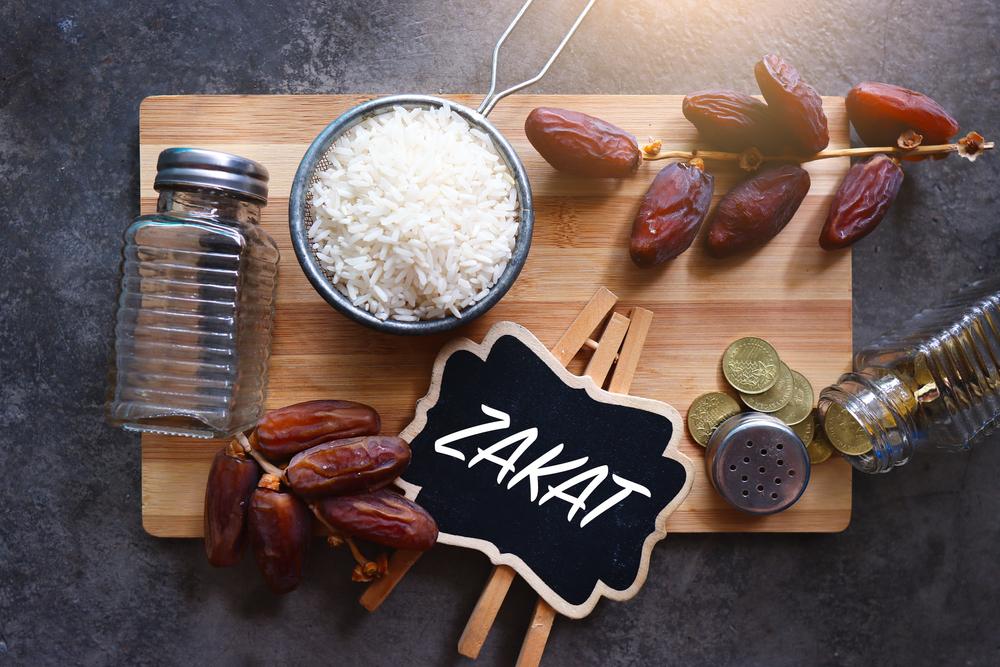
The term Zakat-al-Fitr means charity on breaking the fast. Zakat-al-Fitr is a charity that becomes obligatory on breaking the last fast of Ramadan – namely end of Ramadan. It is reported that Ibn ‘Abbaas (may Allah be pleased with Him) said:
“The Messenger of Allah SAW made Zakat al-Fitr obligatory as a means of purifying the fasting person from idle talk and foul language and to feed the poor.” [Abu Dawood, 1371]
In the light of the above report, it is evident that Zakat-al-Fitr is prescribed for spiritual purification of the fasting person. It is a kind of expiation from sins such as the inappropriate use of the tongue and has to be given in the form of staple food to those in need. According to the scholars, Zakat-al-Fitr is like the prostration of forgetfulness. It makes up for any inadequacy during the fast, just like the Sajdah of forgetfulness makes up for the shortcomings in prayer.
Zakat al-Fitr is obligatory on all Muslims. A distinguished companion of the Prophet SAW, Ibn Umar, is reported to have said:
“The Messenger of Allah SAW made Zakat al-Fitr, one saa’ of dates or one saa’ of barley, obligatory on the Muslims, slave and free, male and female, young and old.” [Al-Bukhaari, 1407]
Zakat-al-Fitr is compulsory on everyone who can afford to pay it. The scholars state that, on the beginning of Shawwal, everyone who has enough to pay Zakat-al-Fitr in addition to food for himself and his family must pay Zakat-al-Fitr. This implies that at the end of Ramadan, those in possession of food for a day for themselves and dependents are obliged to give Zakat-al-Fitr.
As the donation has to be paid by every Muslim - including children, new-born babies or other dependants - it has to be paid by the guardian on behalf of all those under his care.
Those who do not have enough food for their own survival are not required to pay Zakat-al-Fitr. The purpose of Zakat-al-Fitr is to help those in severe financial difficulty and deprivation. Donating around the time of Eid allows Muslims to feed the most vulnerable individuals of the society.
According to the Sunnah of the Prophet SAW, the amount of Zakat-al-Fitr is one Saa’. In a report from Al-Bukhari from an honourable companion, Abu Saeed Khudri R.A. said:
“At the time of the Prophet SAW we used to give it in the form of a saa’ of food…”
Approximately, a saa’ is thought to be equivalent to three kilograms of rice. Currently, it is considered to be the value of £5 per person.
Zakat-al-Fitr has to be donated in the form of staple food, according to the established norms and customs. The scholars do not consider it permissible to pay it in the form of money. Rather, it must be given as food. However, it is permissible to appoint someone as a deputy to pay it on your behalf. When donating through charities, your money is used to buy food for needy people which is given to them on your behalf. Give your Fitrana donation to UKIM to ensure the timely payment of your Zakat-al-Fitr.
Zakat-al-Fitr must be given before Eid prayer. In a hadith of Al-Bukhari, the Prophet SAW commanded for it to be donated before Eid prayer. If delayed, it is considered just a normal charity. For the obligation of Zakat-al-Fitr to be fulfilled, it must be paid before people go out to pray. To ensure it reaches the needy on time, it is permissible to give Zakat-al-Fitr in the last few days of Ramadan.
Zaka-al-Fitr has to be given the poor and needy. The philosophy behind it is to ensure everyone in the community gets to eat a good meal on the blessed day of Eid. It teaches the believers to remember the most vulnerable individuals in all circumstances, particularly at the time of joy and celebration.
It is the Sunnah of the Prophet SAW to delay Eid-al-Fitr prayer. It allows the believers sufficient time to give their Zakat-al-Fitr to those who deserve it most. That is why it is Sunnah to have breakfast before going out to pray on the day of Eid-al-Fitr and to eat afterwards on the day of Eid-al-Adha.
Charity has a great importance in Islam. The Quran mentions on various occasions the responsibility of looking after the orphans and feeding the poor. Ramadan provides a great opportunity to the believers to engage in charitable acts and contribute to the welfare of the disadvantaged people. Apart from the payment of Zakat and Sadaqah which is not fixed to Ramadan, the holy month has blessed the Muslims with the gift of Zakat-al-Fitr. It amplifies the donations already made, while securing Zakat-al-Fitr for the end of Ramadan as a compulsory fund - as a way of purification for the fasting person and ease of hardship for vulnerable individuals.
Allah SWT says in the Quran:
“Successful indeed are those who purify themselves.” [87:14]
Copyright © 2025 UKIM All Rights Reserved.
UK Registered Charity Since 1962
Charity Registration No. 250275



